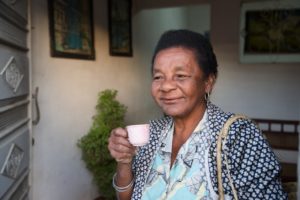Case Study – Managing Pain, A Family Affair
 Print this case study here: Case Study – Managing Pain, A Family Affair
Print this case study here: Case Study – Managing Pain, A Family Affair
Case Studies: Managing Pain, A Family Affair
By Gwendolyn London and Michelle Grant Ervin
Mrs. W is a sixty-year-old African American woman with a recent diagnosis of breast cancer with metastases to the bone and lung. She has been married thirty-two years and has three adult children. Over the last month, she has experienced increasing pain that has not been effectively controlled by her physician. She has now been referred to hospice, primarily to get her pain under control.
After assessing the patient, the hospice nurse recommends long-acting morphine 30 mg twice a day with short-acting Morphine for breakthrough pain every three or four hours as needed. Mrs. W is also placed on Dexamethasone for bone pain. After recommending this treatment, the nurse follows up with Mrs. W in twenty-four hours and finds that Mrs. W is still experiencing pain.
In discussion with Mrs. W and her husband, the nurse discovers that Mr. W allows his wife to take her long-acting Morphine but limits any additional pain medicine because he “doesn’t want her to become addicted.” He tells the nurse that her church is praying that she will be relieved of pain. Mrs. W complies with her husband’s wishes, but often grimaces when she is visited by hospice staff (nurse, clinical nursing aid, social worker, chaplain).
As Mrs. W continues to decline, she and her husband finally agree to transfer her to an inpatient unit. Mrs. W dies four days after transfer to the inpatient unit, at peace and completely pain free.
Gwendolyn London, DMin, is president of London and Associates and director of the District of Columbia Pain Initiative.
Michelle Grant Ervin, MD, MHPE, FACEP, is medical director of the Capital Hospice DC office, chair of the District of Columbia Pain Initiative, and president elect of the American Alliance of Cancer Pain Initiatives.


